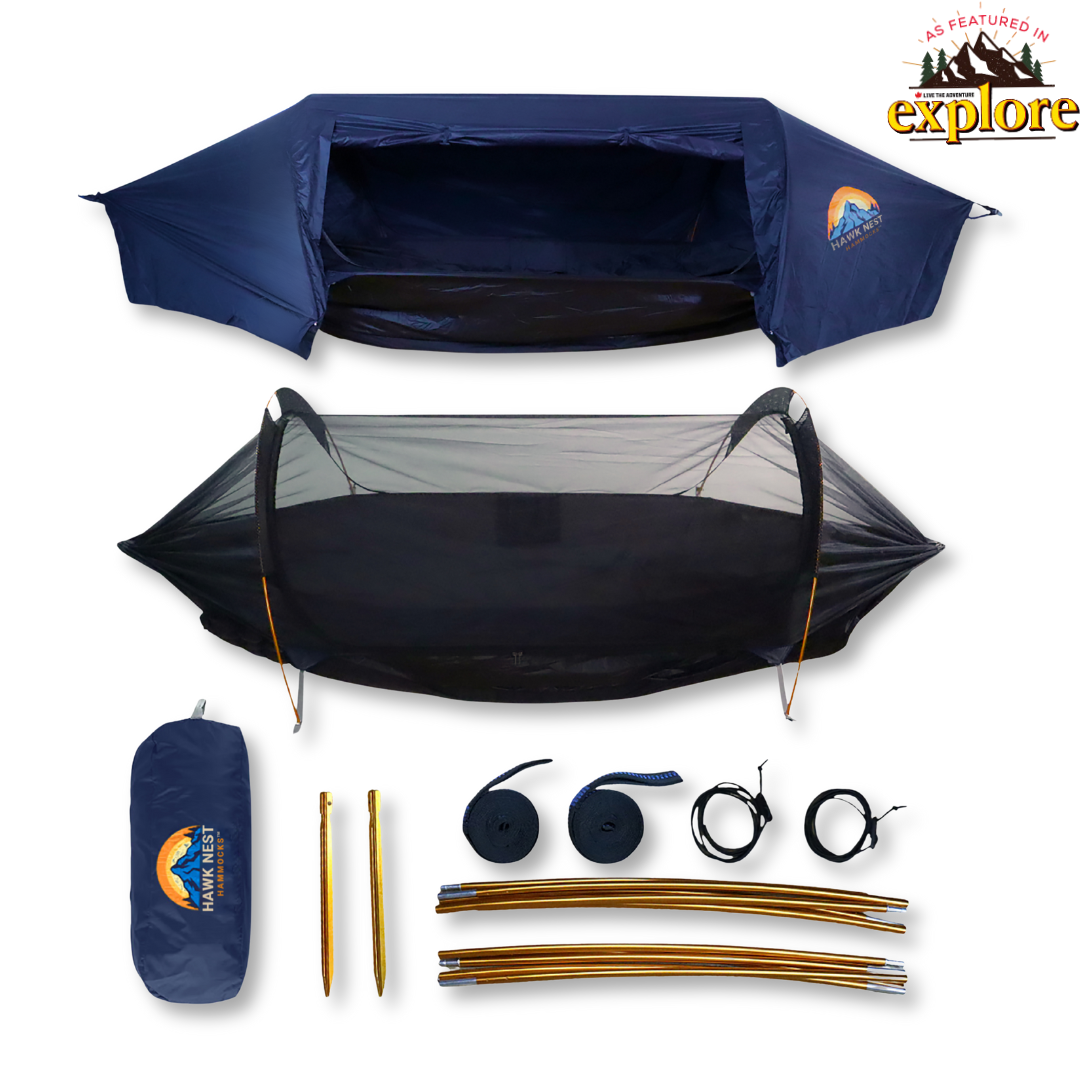Table of Contents
- Introduction to Hammock Tent vs. Ground Tent Camping
- Advantages of Hammock Tents
- Advantages of Ground Tents
- Comparative Analysis: Hammock Tent vs. Ground Tent
- FAQ and Conclusion
Introduction to Hammock Tent vs. Ground Tent Camping
Overview of Camping in Canada
Camping in Canada is a favorite activity for many families and adventurers. With vast natural landscapes, from towering mountains to lush forests, there is no shortage of places to explore. Whether you're setting up camp near a serene lake or in a dense forest, the choice between a hammock tent and a ground tent is crucial. Each offers a unique way to experience the wonders of the Canadian outdoors.
Importance of Choosing the Right Camping Gear
Picking the right camping gear can make or break your outdoor experience. When considering hammock tent vs. ground tent, it's important to think about what fits your camping style best. This decision will affect how well you sleep and how much you enjoy your trip. Here are some key points to consider:
- Comfort: Do you prefer sleeping above the ground or on it?
- Location: Are there trees available for a hammock, or is the area more suited for a ground tent?
- Weather: Will you face rain or cold temperatures where extra shelter might be needed?
Making the right choice will help ensure you have a fun, safe, and comfortable adventure in the great Canadian outdoors. Keep reading to learn more about the advantages of each option and find out which might be best for you!

Advantages of Hammock Tents
Setup and Flexibility
Hammock tents are a popular choice for many Canadian campers due to their easy setup and flexible nature. Setting up a hammock tent can be as simple as finding two sturdy trees and using straps to secure the hammock in place. This flexibility allows campers to set up their sleeping area in various environments where traditional tents might not be feasible, such as rocky terrains or sloped grounds.
- Quick to set up: Most hammock tents can be set up in less than ten minutes once you find the perfect spot.
- Minimal impact on the environment: Hammocks don't disturb the ground or vegetation as much as ground tents might, making them a more eco-friendly option.
Comfort and Sleep Quality
Sleeping in a hammock tent can significantly enhance your sleep quality, especially if you're someone who enjoys the gentle rocking motion of a hammock. The design of hammock tents allows for a more natural sleeping position, aligning the spine and reducing pressure points compared to sleeping on the hard ground.
- Reduced back and neck pain: Many campers report fewer aches and pains after switching to a hammock.
- Stay dry and above the ground: Elevated sleeping means you're away from puddles and ground moisture, which is particularly beneficial in wet conditions.
Impact on Environment
Hammock tents also score highly on environmental impact. Their design ensures that the natural ground flora is not disturbed by the presence of a camper, as they are suspended above the ground. This makes hammock tents an excellent choice for those who are conscious about minimizing their ecological footprint.
- Less ground erosion: Since hammocks do not require flattening a spot or removing vegetation, they preserve the natural habitat.
- Tree-friendly options: Many hammock models come with wide straps that distribute weight evenly and prevent damage to tree bark.
Advantages of Ground Tents
Shelter and Protection
Ground tents are a classic choice for campers who prioritize protection and privacy. They offer a sturdy shelter that shields you from the elements, providing a safe haven regardless of the weather. Here are some of the key protective benefits of choosing a ground tent:
- Weather resistance: Ground tents are designed to withstand various weather conditions, from heavy rain to strong winds, ensuring campers stay dry and secure.
- Privacy: With zippered doors and sometimes even room dividers, ground tents offer personal space that hammocks can't match.
- Insect protection: Fully enclosed with mesh screens, ground tents keep out bugs and other small creatures, which is essential in certain areas of Canada.
Space and Storage Capabilities
One of the biggest advantages of ground tents is the ample space they provide. Whether you're camping solo or with a family, ground tents offer enough room to comfortably store your camping gear, cook, and sleep. This space is not only practical but enhances comfort during extended trips:
- Room to move: Larger ground tents allow for standing and moving around, which can be crucial for long-term comfort on extended camping trips.
- Storage solutions: With pockets and loops, many ground tents come equipped with built-in storage to keep your essentials organized and within easy reach.
- Versatile sleeping arrangements: Ground tents come in various sizes, providing flexibility to accommodate everything from a single sleeper up to large families.
Versatility Across Different Terrains
Unlike hammocks, ground tents don’t rely on specific natural features for setup. This versatility allows campers to choose from a wider range of camping sites, from sandy beaches to rocky hilltops. Ground tents can be secured on nearly any type of terrain, offering reliable shelter wherever you decide to camp:
- Adaptability: Ground tents can be pitched on any flat surface, providing more options for campsite locations.
- Stability: With stakes and guy-lines, ground tents can be made stable enough to handle various ground conditions and weather scenarios.
- Accessibility: For those who prefer easily accessible campsites, ground tents allow you to camp near your vehicle, facilitating easier setup and teardown.
Comparative Analysis: Hammock Tent vs. Ground Tent
| Feature | Hammock Tent | Ground Tent |
|---|---|---|
| Setup | Quick and easy with trees, minimal ground preparation | Time-consuming, requires flat surface |
| Comfort | Ergonomic, reduces pressure on body | Flat sleeping surface, familiar setup |
| Weather Protection | Requires additional gear for full protection | Generally better insulation and protection |
| Portability | Lightweight, compact when packed | Heavier, bulkier, especially with poles and stakes |
| Space | Limited to one or two persons | Can accommodate larger groups and gear storage |
| Cost | Less expensive initially, costs can increase with accessories | Varies, generally higher initial investment but comprehensive |
| Environment Impact | Minimal ground impact, requires suitable trees | More ground impact, flexible location setup |
Cost Considerations
When choosing between hammock tents and ground tents, cost is an important factor for many campers. Hammock tents generally tend to be more affordable than ground tents, especially when considering entry-level models. However, the price can increase significantly when adding necessary accessories like rain tarps and bug nets:
- Initial investment: Hammock tents can be a more budget-friendly option with basic setups starting at a lower price point than ground tents.
- Long-term value: Ground tents often offer more durability and can be used in more diverse conditions, potentially offering better long-term value despite a higher initial cost.
- Accessory costs: Both types of tents require additional purchases for optimal comfort and functionality, which can add to the overall expense.
Suitability for Different Weather Conditions
The choice between a hammock and a ground tent also depends significantly on the weather conditions expected during the camping trip. Here’s how each type of shelter holds up under various climate scenarios:
- Hammock tents: Best for warm, dry weather. They offer great ventilation and comfort in mild conditions but some require additional gear like underquilts and weather tarps to cope with cold or rainy weather.
- Ground tents: More versatile in their ability to handle diverse weather conditions, from heavy rain to snow, thanks to their robust construction and the ability to add insulated pads and sleeping bags.
Equipment and Accessories Needed
Both hammock and ground tents come with their own set of required equipment for optimal use:
- Hammock tents: Typically require straps, carabiners, and possibly a stand if trees are not available. Additional weather protection like tarps and bug nets are also necessary for many camping environments.
- Ground tents: Need stakes, poles, and possibly a hammer or mallet for setup. They often come with built-in weather resistance, but adding a footprint can enhance durability and comfort.
While both ground tents and hammock tents have their pros and cons, it greatly depends on the type of camping you are doing. In our opinion, hammock tents are more comfortable, lighter weight, take up less space in your pack and are easier to set up than a ground tent. This makes the hammock tent a hands down winner for anyone doing multi day backpacking trips.
FAQ and Conclusion
Frequently Asked Questions
Choosing between a hammock and a tent for camping often brings up several questions. Here are some of the most frequently asked questions to help you decide which might be best for your next outdoor adventure:
- Which is more comfortable, a hammock or a tent? Comfort is subjective; hammocks can provide a unique sleeping experience with less pressure on your body, ideal for back sleepers. Tents offer a more traditional sleeping setup, which may be preferable for side or stomach sleepers.
- Are hammocks or tents better for cold weather? Tents generally provide better insulation from cold weather, thanks to their ability to host insulated sleeping pads and their protection from the wind. Hammocks may require additional insulation such as underquilts to be comfortable in cooler conditions.
- What should I consider about the setup? Hammocks require trees for setup and are generally quicker to set up than tents. Tents need a flat surface and take more time to pitch but can be more versatile in different environments.
- Which is more cost-effective? Initially, hammocks can be more affordable, but adding necessary accessories like tarps and bug nets can increase the cost. Tents vary widely in price based on size and features.
Conclusion
Whether you choose a hammock or a tent depends on your personal preferences, the environment where you will be camping, and the conditions you expect to encounter. Hammocks offer a lightweight, comfortable option in forested areas and are excellent for warmer climates. Tents provide superior protection from the elements and are better suited for cold weather and diverse terrains.
For further details on hammocks and tents, consider visiting detailed articles and reviews available at Thru-Hiker, The Hiking Adventure, and Hammock Advice.
If you are interested in getting your own hammock tent, you can checkout our Hawk Nest All-Season Hammock Tent, or checkout our homepage. Want to learn more about hammock tents? Checkout Mastering the Art of Hammock Tent Camping in Canada.


